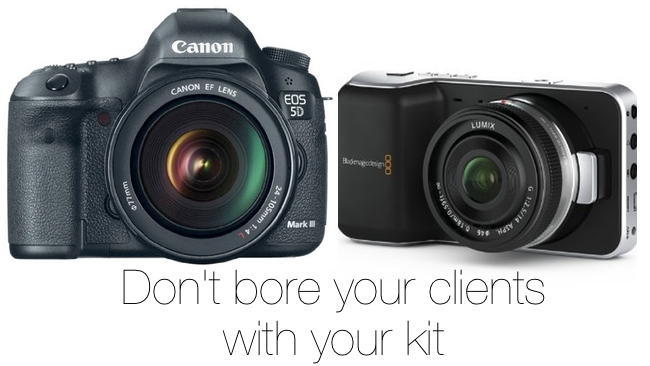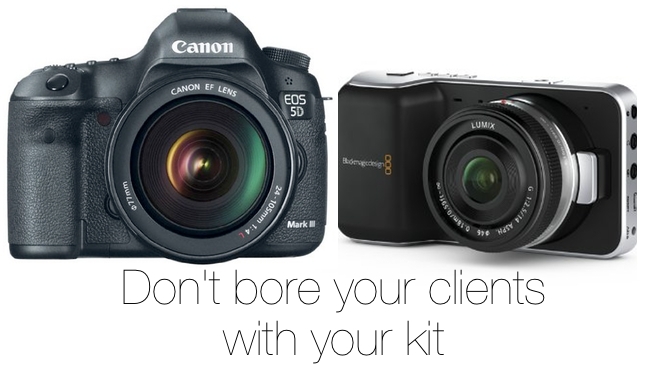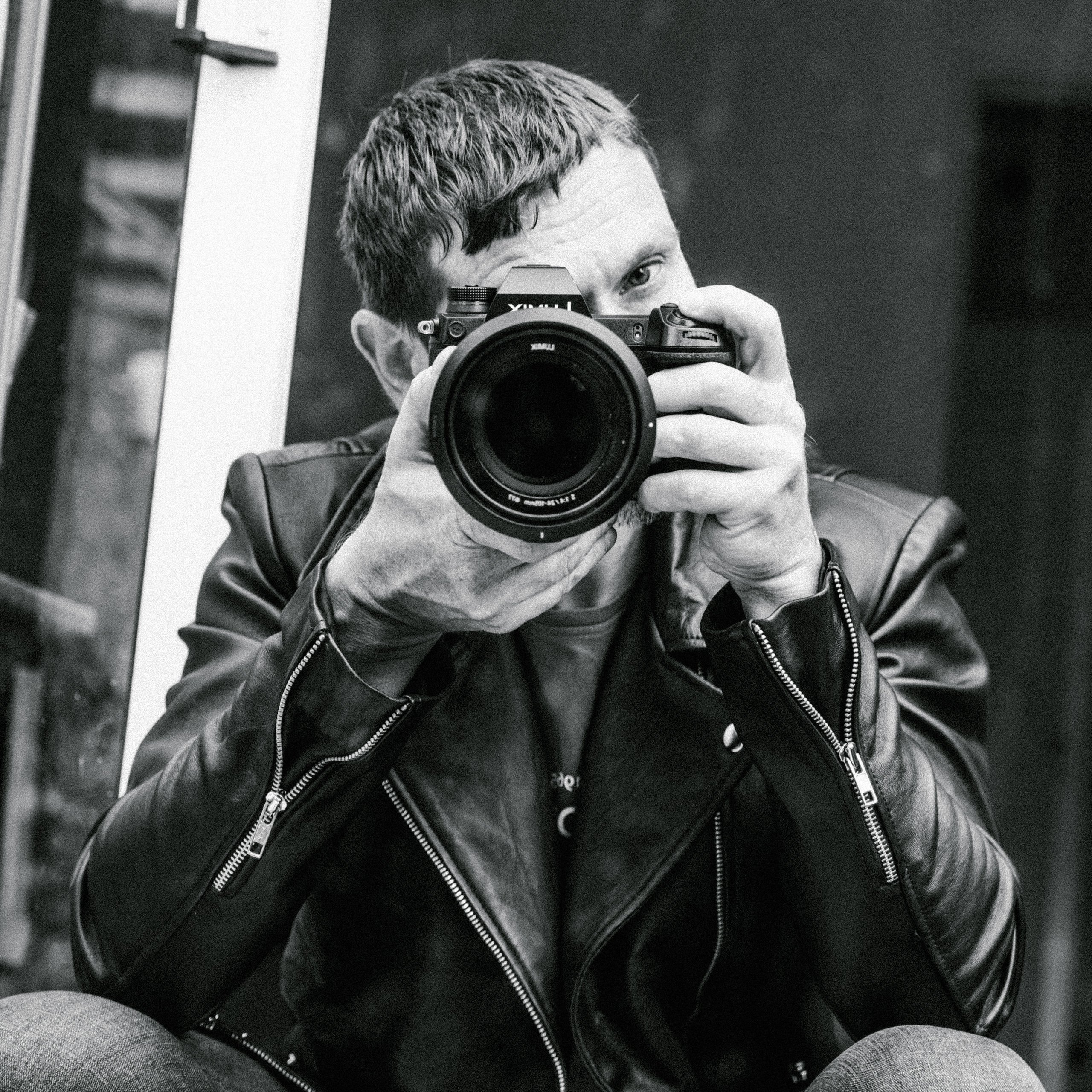
 Don't bore your clients with your kit
Don't bore your clients with your kit
Your client is more interested in the videos you can create than the tools you use to make them
It is a very human trait to be constantly obsessed about what we look like and how other people view us. You only have to look at the the way most of us dread the idea of a job interview. Much of the advice out there for such experiences is geared towards how to present yourself and the type of information to give.
Such advice is interesting because it makes the whole process appear as if it is full of pitfalls for social faux pas. Yet such advice consistently forgets to deal with one thing. When you go to an interview you will be dealing with people, not robots.
Media companies and "image"
When it comes to media companies this whole idea of image is often taken to the nth level. Companies post up photos of their latest gear on their Face Space pages, their cameras dressed up to the nines like some sort of entry for a camera equivalent of Come Dancing.
Cries of how they will not compromise on image quality for their clients abound, and it is admirable that they take such pride in this. It is however something that does not need shouting about. If you really want to shout about image quality then do the practical thing and show the world via your reel!
The fact that image quality is not primarily a camera related thing these days aside, ironically such things often alienate the people who we wish to please. The client.
If you are primarily working for other media companies rather than directly for the end client, then perhaps the precise gear that you own is important to you. I say this quite often, but it is worth reiterating, but despite the way our line of work is often presented to the wider world, the great big fact is that it is only a minority of us who are working in television or film, and if we are then using a wide variety of gear is the order of the day, not just a single camera that we own.
Your client doesn't know a Sony F55 from a Canon 5D
Whether your client is the National Heath Service (in the UK), a marketing firm, the local council, or a multi-national producer of products of some sort, the camera that you own is one of the last things you should be plastering all over your social media pages and company website. Your client doesn’t know a Sony F55 from a Canon 5D, much less they even care!
There are three things that your client wishes to know.
1. Can you understand what they want?
2. Can you produce what they want?
3. Can they work with you?
Sounds obvious doesn’t it? Notice that I haven’t included price in that list. If you are competitive then you have nothing to fear. You don’t even have to be the least expensive. Even large companies forget these three things. However one of the most curious things that I see is small companies trying to appear big.
I can’t help but think back to an occasion where I was asked to pitch for a job to a fairly large company. I had turned up at the reception to sign in and saw that throughout the day there had been many other people from my local competition, including one particularly large firm with an impressive client list as long as your arm, and then some.
Pitching for the job
My initial thoughts were that I didn’t stand a chance. I had done freelance work for that company and knew of the big multi-nationals that they did major work for. How was a one man band who hires in crew and gear as and when is needed going to compete with such an outfit?
I was the last vendor of the day, and so the two managers who I was going to meet had just been through a full day of dealing with video production company reps. I knew that I was going to be fighting an uphill battle with these jaded souls.
Did I go in there with guns blazing, telling them all about my achievements and how wonderful my camera gear is? Did I bore them to tears with my demo reel?
No. Instead I went in there and I was honest. I told them who I was and made no secret of the fact that I ran the company on my own when asked. I had prepared an example of a video similar to what I thought they were after. It was a simple affair with no frills, but delivered the information in a precise, succinct way.
Relief
The look of relief on their faces was a sight to behold. They admitted to me that many of the vendors that they had been speaking to, including the large company I mentioned earlier, had been talking to them for an hour or so each, and still didn’t seem to understand what they wanted. Apparently the discussions had even become quite heated at times.
They were being bombarded with all sorts of ideas for animations and other completely unnecessarily complicated, and expensive ways to produce the video. On the other hand I had made an attempt to understand what they actually wanted from the brief and had nailed it within the first minute of speaking to them. I was hired before I had even given them a quote, and I have done numerous works for them since.
Now although that probably came across like a big trumpet blowing session - it wasn’t intended to be - it illustrates a point. The client primarily just wants you to be able to understand them, offer practical solutions, and then deliver on them.
They don't care
They do not care what camera you own or how many accessories you add to it. It is part of your job to choose the right gear for the work. This might sound like an assault on the ears of a camera or gadget junkie, but the fact of the matter is that some of the most successful video operations I know of do not own the most current of gear. Yet they still get work time after time. The reason for this is that their clients like working with them and the results they get. The video companies in question understand their clients and they make every effort to produce videos that work.
The key thing here is that you don’t have to appear to be a large company or one that owns cameras the size of the starship Enterprise in order to appear competent and professional. “Competent and professional” is in the way that you work, not the gear that you turn up on set with.
Often I talk to video producers who keep a large camera simply because they feel that it gives the client a better impression while filming is taking place. Such impressions are not worth the effort. For one thing if you are recording interviews or performing many other types of shoot it will be clear from the people you are working with and your ancillary gear such as lights and microphones etc that you are not some jock. If you are doing your job you will be using the right gear for the right job and will be working to budget accordingly.
If by some stretch the client really was in doubt one would hope that the end result will speak for itself! If it doesn’t then maybe you really are in fact just a jock and your fears are from insecurity based on realities!
It is easy to forget the reality of what real-world clients think when we within the industry are bombarded with numerous videos and articles by camera gurus, many of whom aren’t actually making purposeful videos for paying clients or to deadlines themselves.
You should be confident enough in the work that you produce not to feel that you have to be herded like a sheep by the eye candy on offer. Upgrade when you are truly able to and need to, and base your perceptions of what a client may or may not think upon realities rather than insecurity.
Tags: Business


Comments